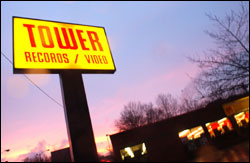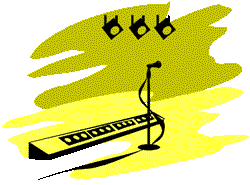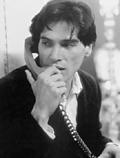THE MUSIC-BUSINESS wars seemed to have claimed yet another victim last Monday, Feb. 9, when MTS, the privately held corporation that owns Tower Records, filed for Chapter 11 bankruptcy, listing more than $100 million in assets and approximately $100 million in debts. But Tower, which has three Seattle-area locations, claims the bankruptcy declaration was strictly a restructuring and that the stores will carry on as normal.
That’s good news for local buyers of classical music, world music, and imports—three areas in which Tower excels. The chain’s Bellevue location, however, will close at some point. “There’s not a timeline attached to that, but for the rest of the stores, [it] will be business as usual,” says spokesperson Anita-Marie Laurie.
Tower’s chainwide financial issues are common in the music industry right now, thanks to Internet file trading and a poor economy. But in Seattle, the company also has some uniquely local challenges. For years, Tower was the biggest and best record shop around, particularly the Lower Queen Anne store at 500 Mercer St. Its status as a Ticketmaster outlet made it that much more of a draw. Even without the post-Napster downloading boom, though, the quiet rise of local independent stores Easy Street and Sonic Boom, as well as the northern expansion of Portland’s Everyday Music, which took over the old Cellophane Square location at 112 Broadway Ave. E. last year, would likely have chinked the multinational’s armor.
The most significant example is Easy Street, which expanded from a well-stocked West Seattle location to a second store on Lower Queen Anne—in the old Tower Books location, ironically enough, at West Mercer Street and Queen Anne Avenue North. Says Easy Street owner Matt Vaughan: “I felt that Seattle had deserved a strong independent presence ever since Peaches had gone by the wayside back in the early ’90s. There were many retailers, but most of them were highly specialized or community stores, like our West Seattle store.”
As pop music has become more and more niche-marketed, trend consciousness has become crucial to a retailer’s survival—especially in Seattle, a city deeply rooted in independent music as well as grassroots politics and business. “Independent retail can react to a trend that is happening in town immediately, if not help break certain acts and stimulate awareness of genres and scenes,” says Vaughan. Tower’s somewhat faceless public profile and high retail prices haven’t helped it.
IF TOWER’S assurances to continue operating prove groundless and Seattle’s two locations close, the loss won’t just be felt by pop fans. “It will be a shame to lose such a premier classical selection,” says Easy Street’s Vaughan. “It’s one of the best classical selections in the Northwest, if not the West Coast. That buyer has been there for something close to 20 years.” And it won’t be felt just by consumers. “My biggest fear,” says Vaughan, “is that it may affect my industry’s infrastructure locally. I would hate to see any more jobs at labels and distributors lost because of a store of [Tower’s] size closing.”








